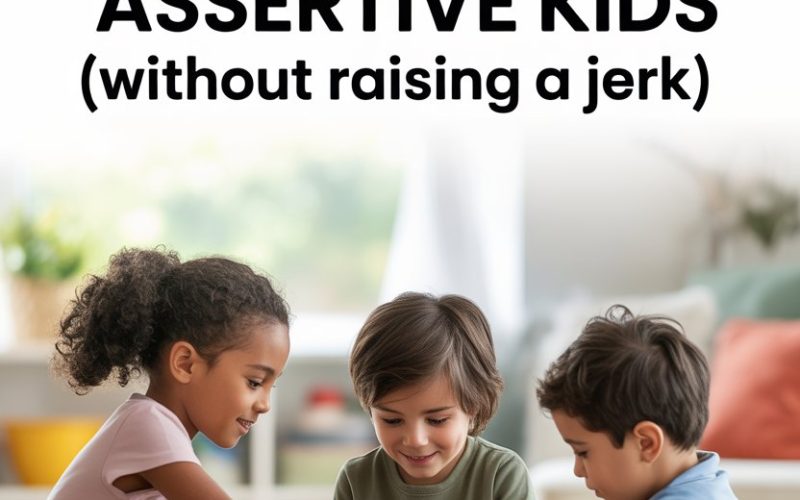An assertive child who can stand up for themselves is a blessing. An assertive child who steamrolls everyone in sight? Slightly less charming.
Teaching kids to be strong and self-assured without tipping them into pushy territory sometimes feels like defusing a bomb using only oven mitts.
Yet it’s entirely possible—and, with a dash of patience and a splash of humour, even enjoyable.
Assertive, Not Aggressive: Drawing the Line
Kids are expert boundary-testers—something no parent needs a Ph.D. to know.
But if you want your child to voice their opinions and stick up for themselves, they’ll need to learn the difference between being assertive and being aggressive.
Assertiveness is all about expressing thoughts and needs in a clear, respectful way. Aggression, on the other hand, tramples right over everyone else’s toes (and sometimes Lego constructions).
Teach your child that it’s fine—brilliant, even—to say, “I don’t like it when you grab my toy,” but it’s not okay to snatch it back with a screech and a flying elbow.
Model this yourself: acknowledge your own feelings calmly in moments of stress (“I’m frustrated when the dishes pile up”) instead of dramatically threatening to run away to a remote island.
Give Them Words and Watch Them Use Them
As much as we’d love children to come pre-installed with self-advocacy scripts, most of them need a little coaching.
Kids who have the words to express themselves are less likely to resort to yelling, sulking under the table, or dramatic declamations of “Nobody likes me!”
Practice role-playing tricky scenarios together. Try, “If someone cuts in line at the slide, what could you say?” Or, “If your mate says something that makes you feel bad, how might you respond?”
The more practice they get when the stakes are low (stuffed animal tea parties count), the easier it becomes when emotions run high.
Research suggests that teaching children explicit communication skills early lays the groundwork for healthy assertiveness as they grow.
Let Them Disagree—Even With You
Yes, it gets noisy. Yes, it gets messy. But when your child learns they can disagree respectfully with you, they’re miles ahead in learning to do it elsewhere.
Hear them out, even if their argument is “But I feel like eating ice cream for dinner is totally fine.” Thank them for sharing their view (“I see you have strong feelings about dessert-for-dinner night”) and explain your reasoning.
This models back-and-forth dialogue and teaches them that respect is a two-way street, not a cul-de-sac.
Parents who encourage respectful debates at home raise children who are more confident in voicing opinions in the classroom, on the playground, and later on, at work.
Encourage Empathy as Much as Independence
Being assertive doesn’t mean flattening everyone else’s feelings. The most self-assured kids are also usually the most empathetic.
Talk about feelings—yours, theirs, the dog’s, the fictional hedgehog in their bedtime story.
Ask, “How do you think your friend felt when you said that?” or, “What could you do if someone looked sad after you spoke up?”
This isn’t just warm-and-fuzzy stuff; studies have shown that empathy training in childhood leads to better social skills, stronger relationships, and less likelihood of turning into That Kid who never gets invited anywhere.
Set Clear Boundaries—and Explain Why They Matter
Strong, assertive kids need to know where the fence posts are. Clear, consistent boundaries help them feel safe enough to speak up without fear that the floor will drop out from under them.
Explain rules and the reasoning behind them. “We use kind words because words can hurt,” delivers the message far better than, “Because I said so.”
Consistency is your best friend here. If “no TV after tea” applies on Wednesdays but not Thursdays, expect negotiations to rival the UN Security Council.
Praise Assertiveness—Not Rudeness
You know that moment when your child finally tells a pushy classmate, “Please stop pushing me, I don’t like it”? That’s gold.
Celebrate it! But skip the standing ovation if they follow up with, “And you’re stinky, too.”
Point out exactly what you loved about their behavior (“You told him how you felt without being mean”), and gently redirect when they cross the line (“It’s not okay to call people names, even if you’re upset”).
This teaches kids to distinguish between speaking up and putting others down. Over time, they’ll get better at threading the needle.
Be the Role Model You Hope They’ll Copy
Nothing bursts a parenting bubble quite like realizing you’ve just barked “Use your words!” at your child—in full earshot of the neighbours—while waving a spatula.
Kids are watching, even when your coffee’s gone cold and your patience is thin.
Model assertiveness yourself: say no when you need to, apologise when you’re wrong, and stand up for your own needs in a calm, clear way.
If a well-meaning relative suggests your toddler should “give Aunt Edna a kiss,” you have a golden opportunity: “We let our kids decide who they want to hug or kiss.”
This signals loud and clear that everyone’s boundaries matter—including theirs.
Open Up Space for Problem Solving
It’s tempting to swoop in and fix every playground spat, but stepping back (unless there’s actual blood, obviously) gives kids a chance to flex their own assertiveness muscles.
Ask open-ended questions: “What do you think you could do about this?” or, “How can you let your friend know what you want?” Don’t rush to provide solutions, even if that means enduring five awkward seconds of silence.
You’ll be amazed at what kids can come up with when given a little breathing room.
Research published in developmental psychology journals shows that children who get to practice negotiating and solving social problems grow up to be more confident and socially adept.
Teach the Magic of ‘No’
The word ‘no’ gets a bad rap, but it’s actually the backbone of healthy assertiveness.
Kids who know when and how to say ‘no’ are less likely to be pushed around—and, conveniently, less likely to become bossy little despots themselves.
Role-play saying ‘no’ in polite but firm ways: “No, thank you, I don’t want to play that game,” or, “No, I don’t like it when you tickle me.”
Celebrate the times they stand their ground, even if it’s just refusing another helping of peas.
At the same time, teach them to accept ‘no’ from others gracefully, without flailing on the floor like a Premier League striker. The world does not, after all, revolve entirely around their whims (as much as they’d like to believe otherwise).
Don’t Shy Away from Apologies
Assertive kids sometimes get it wrong.
Actually, all kids do—they’re practically professionals. But a child who learns to apologise when they’ve crossed the line will never be a jerk for long.
Model unembarrassed apologies yourself (“I snapped at you earlier, I’m sorry”), and talk about what makes a good apology: sincerity, no excuses, and listening to how the other person feels.
Kids who can apologise without a meltdown are the kids other parents want at their playdates. And who doesn’t want that?
Celebrate Differences and Quirks
Not every strong, assertive child is a future debate team captain. Some are quiet but determined, others are full of opinions and glitter. Show your child that there’s more than one way to be confident.
Support their interests, even if you don’t understand them (“Yes, you can have another book about tractors”). Encourage them to advocate for what they love, while also respecting what others love.
The world needs passionate, quirky, kind kids who can stand up for themselves—and who leave plenty of room for others.
Assertiveness Grows With Your Child
Raising a child who stands up for themselves without trampling everyone else is an ongoing process—one that doesn’t end when they can tie their own shoes or (miracle of miracles) remember their lunchbox every day.
Expect mistakes, awkward attempts, and the occasional foot-in-mouth moment.
That’s not just normal; it’s a sign that your child is learning to balance their own needs with the needs of others.
Keep the conversations going. Be the safe harbour they return to when things get complicated.
Laugh together at the times things go sideways, and celebrate the small victories.
Strong, assertive kids who understand kindness as much as confidence? The world could use a few more of those.
And with your help, there will be.




